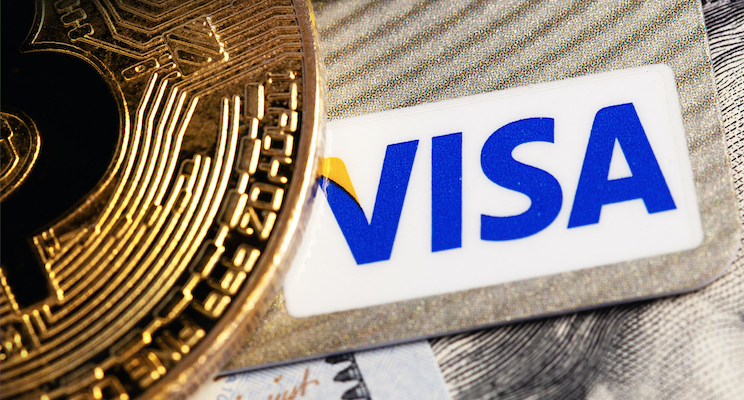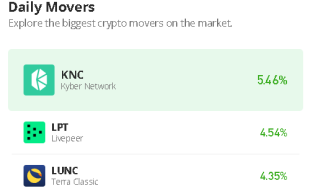Join Our Telegram channel to stay up to date on breaking news coverage
A day after posting earnings that beat expectations, Visa (V) is expanding the use of another significant crypto company on its payment network. This most recent card from Luxembourg-based Blockchain.com will be distributed by the fintech company Marqeta (MQ), is fee-free, and lets users earn 1% back in cryptocurrency. The action continues a long-standing trend of cryptocurrency businesses attempting to make it simpler for clients to use their investments in digital assets to pay for real world products and services.
The future of money movement, according to Chuy Sheffield, director of crypto at Visa, “is built on access. We’re thrilled to collaborate with top cryptocurrency exchanges like Blockchain.com to open up new opportunities for users to use their cryptocurrency for regular transactions.”
Blockchain.com reported that 50,000 people have already joined the waitlist for their customer account-linked debit card, which is initially rolling out to U.S. clients with plans to spread to Europe by the beginning of next year.
According to the company’s co-founder and CEO Peter Smith, “it’s truly about client demand.” The debit card, and cards in general, are at the top of our clients’ list when we ask them what features they want next.
Visa debit card from Blockchain.com
Rival exchange FTX announced earlier this month that it would increase its cooperation with Visa by distributing debit cards to 40 more nations, beginning in Latin America. AMC, Home Depot, Microsoft, Overstock, Virgin Airlines, Whole Foods, and the nation of El Salvador are just a few of the well-known companies that accept bitcoin as payment. With more than 70 collaborations with cryptocurrency companies, Visa already offers cards produced by Coinbase, Binance, and numerous more businesses.
According to a research from cryptocurrency lender BlockFi, users of its card spent a third more than the typical American consumer within the first three months after card issuance.
One of the biggest cryptocurrency processing companies, BitPay, with headquarters in Atlanta, claims to have handled 422,197 transactions over the course of the past six months and 66,186 over the past 30 days. That still only makes up a tiny fraction of total payment transactions. For the three months ended September 30, Visa reported processing 50.9 billion payments transactions.
Given their exchange rate volatility and usability, the majority of U.S. customers outside of the crypto community haven’t expressed a unanimity of interest in cryptocurrencies, let alone their usage as a form of payment. The volatility conundrum can be somewhat avoided, though, by using dollar-pegged stablecoins, which can be available in a variety of risk levels.
Two more factors that may be preventing American customers from using cryptocurrency as payment methods are regulation and public awareness. In a survey by the Crypto Council for Innovation, a trade group with headquarters in Washington, D.C., 52% of American voters said they wanted more regulation for cryptocurrencies, while 62% said they don’t give them any thought. A little fewer than equities (16%), only 13% of respondents claimed to own cryptocurrency.
Companies that issue debit cards make money from the interchange charge that retailers pay. According to Visa, interchange costs for debit and credit cards issued by businesses with less than $10 million in assets, like Blockchain.com, can range up to 2.5% every transaction.
According to Dan Dolev, a senior fintech analyst at Mizuho Securities, companies that accept debit cards can earn anywhere between 0.5 and 1.2% after Visa and any additional partners.
The launch of Blockchain.com’s debit card comes after the market valuation of all cryptocurrencies has fallen by more than half, from $2.18 trillion at the start of January to $996 billion, according to Coinmarketcap.
Cryptocurrencies plunged in the second quarter following the completion of a $490 million series D financing round in March, which placed Blockchain.com as one of the largest companies in the sector. According to a court document in the bankruptcy case of Three Arrows, the company also provided the problematic crypto hedge fund Three Arrows Capital with a $270 million cryptocurrency loan.
Smith feels the new card offering offers another another practical application for cryptocurrency that people are searching for, albeit acknowledging that some short-term revenue instability is unavoidable for cryptocurrency businesses. People “will need more access to the crypto market in a future where crypto is genuinely successful,” Smith said. “Our consumers want to be able to use their cryptocurrency for daily purchases in addition to investing and saving in it,” says the company.
Related
- Visa collaborates with Ripio to launch Bitcoin Debit Card
- Visa partners with FTX to offer crypto debit cards in 40 countries
- Blockchain.com secures regulatory approval in Dubai
Join Our Telegram channel to stay up to date on breaking news coverage


